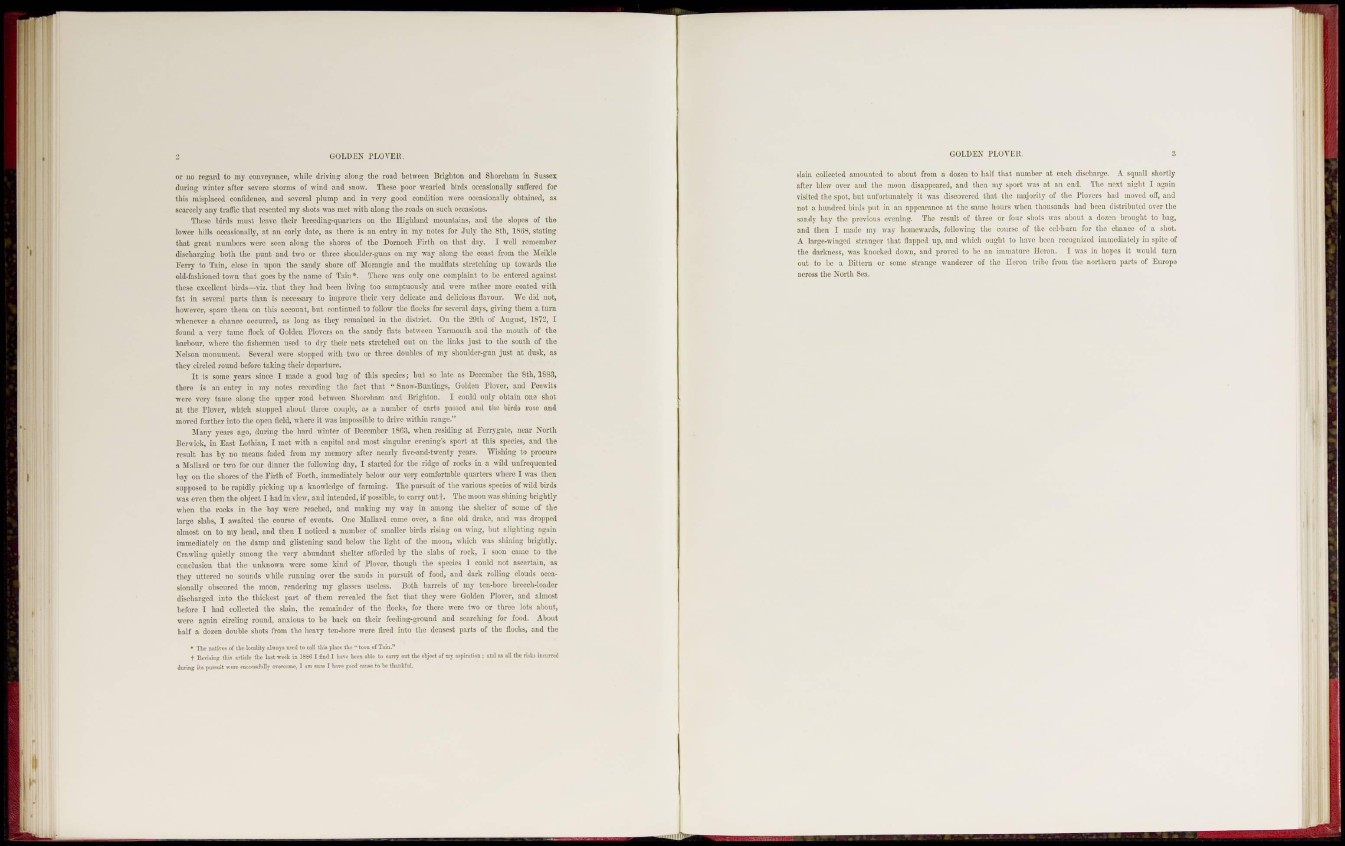
GOLDEN PLOVEB.
or tin regard to my OOnreyenoe, while driving along the road between Brighton and Shoreham in Sussex
during winter after severe storm* or wind and snow. These poor wearied birds occasionally suffered for
this misplaced confidence, and several plump nnd in very good condition were occasionally obtaimil, as
scarcely any traffic that resented my shots was met with along the roads on such occasions.
These birds must leave their breeding-quarters on the Highland mountains, and the slopes of tbo
lower bills occasionally, at an early date, as there is au entry in my notes for July the Sth, lsij-*, stating
that great numbers were seen along the shores of the Dornoch Firth on that day. I well remember
disebaiging both the punt and two or three shoulder-guns on my way along the coast from the Meiklo
Ferry to Tain, close in upon the sandy shore off Moraugie and the mudllats stretching up towards tbo
old-fashioned town that goes by the name or Tain". There was only one complaint to be entered against
these excellent birds—viz. that they bad been living too sumptuously and wen' rather more coated with
fat in several parts than is necessary to improve their very delicate and delicious flavour. We did not,
however, spare them on this account, but continued to follow the flocks for several days, giving them a turn
whenever a chance III mm 11 III, as lung as they remained in the district. On the 29th of August, 1872, I
found a very tame flock of Golden Plovers on the sandy fiats between Yarmouth and the mouth or the
hnrliour, where the fishermen used to dry their nets stretched out on the links just to the south of the
Nelson monument. Several were stopped with two or three doubles of my shoulder-gun just at dusk, as
they circled round befon' taking their departure.
It is some years since I made a good hag of this species; but so late as December the 8 th, 1SS3,
there is HI entry in my notes recording the fact that " Snow-Bunlings, Golden Plover, and Peewits
were very tame along the upper road between Shnrehnm and Brighton. I could only obtain one shot
nt the Plover, which stopped about three couple, as a number of carts passed and the birds rose and
moved further into the open field, where it was impossible to drive within range."
SI any years asro, during the bard winter of December 1888, when residing at Ferrygate, near North
Berwick, in East Lothian, I met with a capital nnd most singular evening's sport at this species, and the
result has by no means failed from my memory after nearly five-and-twenly years. Wishing to procure
a Mallard or two for our dinner the foBowing day, I started for the ridge of rocks in a wild unfrequented
lay on the shores of the Firth of Forth, immediately below our very comfortable quarters where I was then
supposed to be rapidly picking up a knowledge of farming. The pursuit of the various species of wild birds
was even then the object I had in view, and intended, if possible, to carry outf. The moon was shining brightly
when the rocks in the hay were reached, and making my way in among the shelter uf sume of the
large slabs, I awaited the course of events. One Mallard came over, a tine old drake, and was dropped
almost on to my head, and then I noticed a number of smaller birds rising on wing, but alighting again
immediately on the damp and glistening sand below the light of the moon, which was shining brightly.
Crawling quietly among the very abundant shelter afforded by the slabs of rock, I soon came to the
conclusion that the unknown were some kind of Plover, though the species 1 could not ascertain, .as
they uttered no sounds while running over the sands in pursuit of food, and dark rolling clouds occasionally
obscured the moon, rendering my glasses useless. Both liarrcls of my ten-bore breech-loader
discharged into the thickest part or them revealed the fact that they were Golden Plover, and almost
before 1 had collected the slain, the remainder of the Hocks, for there were two or three lota about,
were again circling round, anxious to be back on their feeding-ground and searching for food. About
half a dozen double shots from the heavy ten-bore were fired into the densest parts of the flocks, and the
• 'II,. wmm of Ibr totality •hrajt U>«1 la «11 tin place ibe "(una of Tain."
+ 1!, v .i. a Ihii article the hut week in I —\ I find I have been able u> carry oat the objistt of my •]• r .• r. ; [•.-,:: i !„• n-k, incurred
durinjr in pumuit were -nrL'eaif'iIh overcome. I im "are I hie* gend rauae fo be thankful.
GOLDEN PLOVER.
slain collected amounted to about from a dozen to half that number at each discharge. A squall shortly
after blew over and the moon disappeared, and then my sport was at an end. The next night I again
visited the (pot, but unfortunately it was discovered that the majority of the Plovers had moved off, and
not a hundred birds put in an appearance at the same hours when thousands bad been distributed over the
sandy bay the previous evening. The result of three or Tour shots was about a dozen brought to hag,
and then I made my way homewards, following the course or the eel-burn for the chance of a shot.
A large-winged stranger that flapped up, and which ought to have been recognized Immediately iu spite of
the darkness, was knocked down, and proved to be an immature Heron. 1 was in hopes it would turn
out to lie a Bittern or sume strange wanderer of the Heron tribe from the northern parts of Europe
across the North Sea.